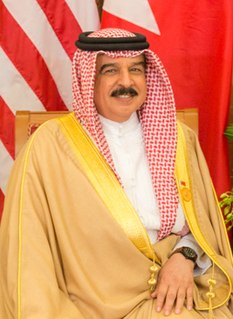
Politics of Bahrain has since 2002 taken place in a framework of a constitutional monarchy where the government is appointed by the King of Bahrain, King Hamad bin Isa Al Khalifa. The head of the government since 1971 has been Prime Minister Prince Khalifa bin Salman Al Khalifa and the Crown Prince is Prince Salman bin Hamad Al Khalifa, who also serves as deputy Commander of the Bahrain Defence Force. The parliament is a bi-cameral legislature, with the Council of Representatives elected by universal suffrage, and the Consultative Council appointed directly by the king.

Hamad bin Isa bin Salman Al Khalifa is the King of Bahrain. He has been the monarch of Bahrain since 6 March 1999, initially reigning as emir, and from 14 February 2002, as the first king. He is the son of Isa bin Salman Al Khalifa, the previous and first emir. The country has been ruled by the Al Khalifa dynasty since 1783.
Torture, the infliction of severe physical or psychological pain upon an individual to extract information or a confession, or as an illicit extrajudicial punishment, is prohibited by international law and is illegal in most countries. However, it is still used by many governments. The subject of this article is the use of torture since the adoption of the 1948 Universal Declaration of Human Rights (UDHR), which prohibited it.
The Asian Human Rights Commission (AHRC) is an independent, non-governmental body that promotes human rights in Asia and mobilizes Asian and international public opinion to obtain relief and redress for the victims of human rights violations. It was founded in 1986 by a prominent group of jurists and human rights activists in Asia and serves to promote civil and political rights, as well as economic, social and cultural rights.

Lyal S. Sunga is a well-known specialist on international human rights law, international humanitarian law and international criminal law.

The Bahrain Centre for Human Rights is a Bahraini non-profit non-governmental organisation which works to promote human rights in Bahrain, which was founded by a number of Bahraini activists in June 2002. The centre was given a dissolution order after its former president Abdulhadi Al Khawaja was arrested in September 2004 a day after criticizing the country's Prime Minister, Khalifah ibn Sulman Al Khalifah at a seminar in which he blamed the Prime Minister for the failure of widespread economic development for all citizens. The BCHR is still banned by the government, but has remained very active.
Colonel Adel Jassim Flaifel is a former colonel in the State Security and Intelligence Service of Bahrain. He is accused of committing, or overseeing, acts of physical and psychological torture on Bahraini citizens from 1980s until 1997. He was released from his duties in December 2002 due to protests and pressures from human rights organizations worldwide. In March 2000, King Hamad awarded Flaifel with the Order of Shaikh Isa bin Salman Al Khalifa.
Torture in Bahrain refers to the violation of Bahrain's obligations as a state party to the United Nations Convention against Torture and Other Cruel, Inhuman or Degrading Treatment or Punishment and other international treaties and disregard for the prohibition of torture enshrined in Bahraini law.
Following Bahrain's independence from the British in 1971, the government of Bahrain embarked on an extended period of political suppression under a 1974 State Security Law shortly after the adoption of the country's first formal Constitution in 1973. Overwhelming objections to state authority resulted in the forced dissolution of the National Assembly by Amir Isa bin Salman Al Khalifa and the suspension of the Constitution until 2001. The State Security Law of 1974 was a law used by the government of Bahrain to crush political unrest from 1974 until 2001. It was during this period that the worst human rights violations and torture were said to have taken place. The State Security Law contained measures permitting the government to arrest and imprison individuals without trial for a period of up to three years for crimes relating to state security. A subsequent Decree to the 1974 Act invoked the establishment of State Security Courts, adding to the conditions conducive to the practice of arbitrary arrest and torture. The deteriorating human rights situation in Bahrain is reported to have reached its height in the mid-1990s when thousands of men, women and children were illegally detained, reports of torture and ill-treatment of detainees were documented, and trials fell short of international standards.

The 1990s uprising in Bahrain also known as the uprising of dignity was an uprising in Bahrain between 1994 and 1999 in which leftists, liberals and Islamists joined forces to demand democratic reforms. The uprising caused approximately forty deaths and ended after Hamad bin Isa Al Khalifa became the Emir of Bahrain in 1999 and a referendum on 14–15 February 2001 massively supported the National Action Charter. The uprising resulted in the deaths of around 40 civilians and at least one Bahraini soldier.

Bahrain's record on human rights has been described by Human Rights Watch as "dismal", and having "deteriorated sharply in the latter half of 2010".
Impunity means "exemption from punishment or loss or escape from fines". In the international law of human rights, it refers to the failure to bring perpetrators of human rights violations to justice and, as such, itself constitutes a denial of the victims' right to justice and redress. Impunity is especially common in countries that lack a tradition of the rule of law, suffer from corruption or that have entrenched systems of patronage, or where the judiciary is weak or members of the security forces are protected by special jurisdictions or immunities.

The following outline is provided as an overview of and topical guide to Bahrain:
The Law of Bahrain is set out in its constitution. Several controversial laws have been passed in the history of the country. The State Security Law of 1974, for example, was used by the government to crush political unrest from 1974 until 2001. Also, the Royal Decree 56 of 2002 issued by King Hamad ibn Isa Al Khalifah grants impunity to security officers and state officials from being prosecuted for human rights abuses prior to 2001. Amiri decrees are also put into effect in the Law of Bahrain.

The Bahraini uprising of 2011 was a series of anti-government protests in Bahrain led by the Shia-dominant and some Sunni minority Bahraini Opposition from 2011 until 2014. The protests were inspired by the unrest of the 2011 Arab Spring and 2011–12 Iranian protests and escalated to daily clashes after the Bahraini government repressed the revolt with the support of Gulf Cooperation Council and Peninsula Shield Force. The Bahraini protests were a series of demonstrations, amounting to a sustained campaign of non-violent civil disobedience and later some violent resistance in the Persian Gulf country of Bahrain. As part of the revolutionary wave of protests in the Middle East and North Africa following the self-immolation of Mohamed Bouazizi in Tunisia, the Bahraini protests were initially aimed at achieving greater political freedom and equality for the majority Shia population, and expanded to a call to end the monarchy of Hamad bin Isa Al Khalifa following a deadly night raid on 17 February 2011 against protesters at the Pearl Roundabout in Manama, known locally as Bloody Thursday.
The Bahrain Independent Commission of Inquiry (BICI), also known locally in Bahrain as the Bassiouni Commission, was established by the King of Bahrain on 29 June 2011 tasked with looking into the incidents that occurred during the period of unrest in Bahrain in February and March 2011 and the consequences of these events.

The National Security Agency or The Bahrain Intelligence Agency (BIA1) is an investigating authority in Bahrain that is associated with but not formally part of the Ministry of the Interior. The NSA was formed after King Hamad issued Decree No. 14 of 2002 declaring it as the replacement of the General Directorate for State Security Investigations. The NSA was granted the power to make arrests by a 2008 Royal Decree, and lost this power in 2011, again by Royal Decree.
Prisons in Bahrain are fully owned and operated by the state. They are run by 3 different security forces, including the National Security Agency (NSA), the Bahrain Defence Force (BDF) and the Ministry of Interior (MoI). Administration of prisons is overseen by a number of judicial authorities as well as the public prosecution. Out of a total of 20 prisons, there are 4 main prisons, one of which is for women. The main prisons are: Al Qurain Prison, Dry Dock Detention Center, Juw Prison and Isa Town Detention Center for women.
Torture during the Bahraini uprising (2011–present) has been described in many human rights reports as being widespread and systematic; 64% of detainees reported being tortured. At least five individuals died as a result. During the uprising detainees were interrogated by three government agencies, the Ministry of Interior (MoI), the National Security Agency (NSA) and the Bahrain Defence Force.
The background of the Bahraini uprising dates back to the beginning of the twentieth century. The Bahraini people have protested sporadically throughout the last decades demanding social, economic and political rights. Demonstrations were present as early as the 1920s and the first municipal election was held in 1926. Ruled by Al Khalifas since 1783, Bahrain was a British protectorate for most of the twentieth century. The National Union Committee (NUC) formed in 1954 was the earliest serious challenge to the status quo. Two year after its formation, NUC leaders were imprisoned and deported by authorities.






